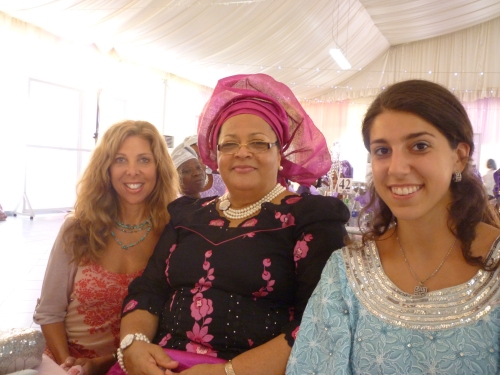Nigerians are particular about food. They prefer to eat at home and hardly eat out at restaurants. They like food that is plenty, has lots of pepper and is piping hot. If they eat outside the house, they like to eat something familiar, food they know is good quality and satisfying. Hence the success of the Nigerian fast food restaurants that serve pounded yam and traditional soups like egusi and efo riro. So when a Nigerian finds him or herself in traffic in Lagos, or running around all day without time for a real meal, he needs something portable, dependable and filling. The answer: the packaged beef roll.

Beef rolls. Gala, Meaty, Chopsy and Bigi
Beef rolls are the most popular, practical snack for the hungry Nigerian. Take ground beef, add a little pink food coloring, wrap it in a doughy, salty, pastry-like bread,

A sausage roll display.
throw it in a plastic wrapper and bam, you have a snack sold on virtually every street corner in Lagos, every traffic jam, and expanding to markets all around the country. Galas roll off the conveyor belts in the factory in Lagos by the thousands everyday and wind up in boxes on top of young boys’ heads selling them in the middle of bumper to bumper traffic. Unlike other snacks on the highway packaged by someone sitting in a market, Gala is a snack Nigerians know they can trust.

Step 1. Grab the roll. Step 2. Slam it against your knee like shown to open it. Step 3. Consume.
The beef roll phenomenon started with Gala, the first brand of packaged beef rolls. Gala was the one on the market and was sold exclusively in Lagos until the 2000’s. My friends in Ibadan tell me that whenever their parents went to Lagos, they always looked forward to the parents bringing back Galas.

Before biting. Notice the different colors and shapes.
In the last six or so years, my friends say the beef roll market has greatly expanded, and Gala is sold in other cities besides Lagos. You see young boys in Ibadan hawking Galas from boxes on their heads in the middle of traffic or the side of the road. Women stack them like Lincoln Logs at their stalls. There is not one place you don’t see Gala or it’s imitations, Meaty, Bigi, Chopsy, etc. I think the consensus is that Gala is still the best, the original beef roll. All my friends detest Bigi, claiming it’s way too hard and the meat is bright pink.

After the taste test.
When I first tried a beef roll, sitting in absurd traffic in Lagos on the way to the U.S. Embassy, I was very apprehensive. The thought of pink ground beef that just does not look natural, wrapped in a thick pastry shell didn’t sound too appealing to me. We Oyinbos threw it around the back of the van like a hot potato. After six months of Nigeria-fication, I accept the beef roll when I am hungry and cant get my hands on other real food. I even enjoy it.
I hear the best combination is Gala and SuperYogo (yet another Nigerian treat). People say La Casera or Fanta with Gala is delicious too. Next time I’m in traffic, I know what I’m eating.

Me conducting the taste test.
Read Full Post »






















